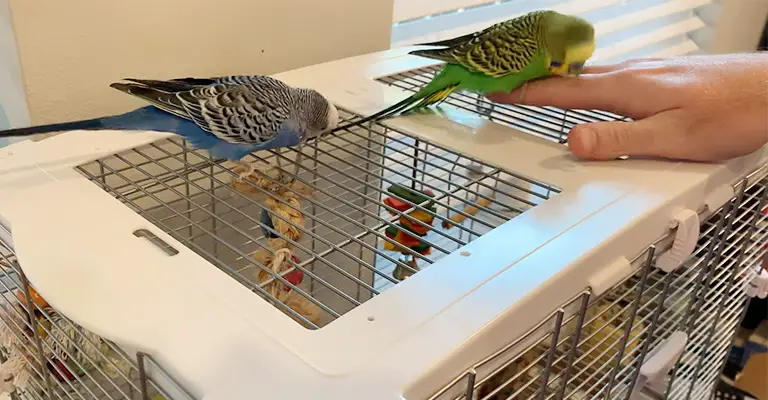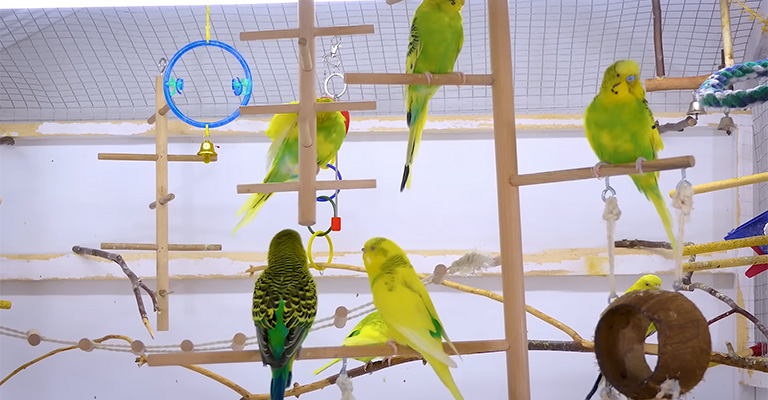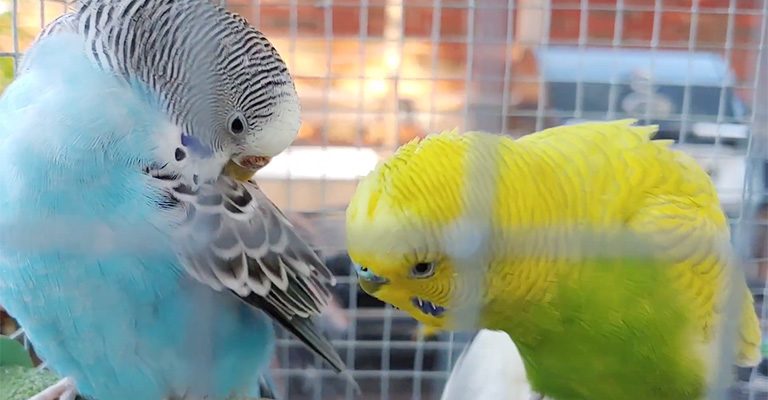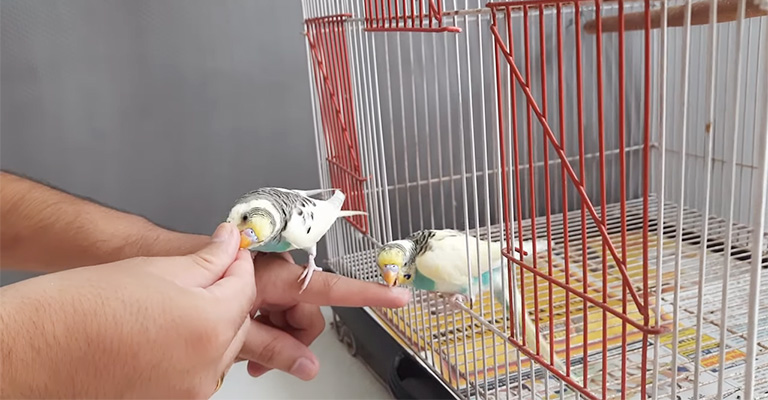The enchanting world of budgerigars, with their vibrant colours and lively personalities, often brings joy to bird enthusiasts.
However, the curious behaviour of one budgie biting another’s tail can raise questions about their interactions and social dynamics.
This peculiar behaviour might appear alarming, but it’s essential to delve into the underlying reasons behind this action.
Understanding budgies biting other budgies’ tails- reasons and how to stop involves exploring the complexities of their social hierarchy, communication, and territorial instincts.
By unravelling this avian mystery, we can ensure the well-being and harmony of these charming companions.

Budgie Biting Other Budgies Tail- Reasons
Budgie biting other budgies’ tails can have different reasons and meanings depending on the situation and the motivation behind the behaviour.
Here are some possible reasons why your budgie may bite another budgie’s tail:
Curiosity
Budgies are very curious and inquisitive birds that like to explore and investigate new things.
Your budgie may bite another budgie’s tail out of curiosity or interest. He may want to see what it is, how it feels, or how it moves. He may also want to learn from the other budgie or copy his behaviour.
Biting out of curiosity is usually gentle and harmless, and it may be accompanied by other curious behaviours, such as tilting the head, looking closely, or making soft sounds.
Playfulness
Budgies are very playful and energetic birds that like to have fun and enjoy themselves. Your budgie may bite another budgie’s tail out of playfulness or amusement.
He may want to tease, challenge, or test the other budgie. He may also want to engage in a game or a chase with the other budgie.
Biting out of playfulness is usually light and friendly, and it may be accompanied by other playful behaviours, such as bobbing, hopping, or chirping.
Affection
Budgies are very social and affectionate birds that like to bond and interact with each other. Your budgie may bite another budgie’s tail out of affection or love.
He may want to show his care, loyalty, or intimacy to the other budgie. He may also want to groom, preen, or cuddle with the other budgie.
Biting out of affection is usually soft and tender, and it may be accompanied by other affectionate behaviours, such as nuzzling, kissing, or feeding.
Protection
Budgies are very protective and caring birds that like to ensure the safety and well-being of their flock members. Your budgie may bite another budgie’s tail out of protection or concern.
He may want to warn, alert, or guide the other budgie away from a potential threat or danger. He may also want to help, assist, or comfort the other budgie who is in need or distress.
Biting out of protection is usually firm and urgent, and it may be accompanied by other protective behaviours, such as guarding, defending, or calling.
Dominance

Budgies are very hierarchical and competitive birds that like to establish their authority and control over their flock members. Your budgie may bite another budgie’s tail out of dominance or aggression.
He may want to show his superiority, power, or ownership over the other budgie. He may also want to make the other budgie submissive, obedient, or fearful of him.
Biting out of dominance is usually hard and harsh, and it may be accompanied by other dominating behaviours, such as biting, pushing, or threatening.
Jealous
Budgies are very possessive and territorial birds that like to claim their resources and partners from their flock members.
Your budgie may bite another budgie’s tail out of jealousy or resentment. He may want to express his displeasure, anger, or frustration towards the other budgie who is taking away his food, toy, perch, mate, or attention.
He may also want to drive away the other budgie who is invading his space, territory, or privacy.
Biting out of jealousy is usually sharp and bitter, and it may be accompanied by other jealous behaviours, such as squawking, screeching, or fighting.
Boredom
Budgies are very intelligent and active birds that like to have mental stimulation and physical activity. Your budgie may bite another budgie’s tail out of boredom or restlessness.
He may want to have some entertainment or excitement in his life. He may also want to relieve his stress or boredom by biting something or someone.
Biting out of boredom is usually random and aimless, and it may be accompanied by other boring behaviours, such as plucking feathers, destroying toys, or pacing.
Hunger
Budgies are very hungry and greedy birds that like to eat a lot and often. Your budgie may bite another budgie’s tail out of hunger or greediness.
He may want to get some food or treats from the other budgie who has more or better food than him. He may also want to share some food or treats with the other budgie who has less or worse food than him.
Biting out of hunger is usually quick and hungry, and it may be accompanied by other hungry behaviours, such as begging, stealing, or regurgitating.
Mistake
Budgies are very clumsy and careless birds that sometimes make mistakes and accidents. Your budgie may bite another budgie’s tail out of mistake or error. He may not have meant to bite the other budgie’s tail, but he did it unintentionally or accidentally.
He may also confuse the other budgie’s tail with something else that he wants to bite or play with. Biting out of mistake is usually brief and apologetic, and it may be accompanied by other mistake behaviours, such as flinching, flying away, or making sorry sounds.
Budgie Biting Other Budgies Tail- How To Stop

If your budgie is biting another budgie’s tail, you may want to stop this behaviour before it causes any harm or trouble. Here are nine possible solutions you can try to stop your budgie from biting another budgie’s tail:
Distract and Divert
You can distract and divert your budgie’s attention from the other budgie’s tail by offering him something else to bite or play with, such as a toy, a treat, or a millet spray.
You can also move him to a different perch or location away from the other budgie. By distracting and diverting your budgie’s attention, you can break his habit of biting the other budgie’s tail and give him a positive alternative.
Scold and Correct
You can scold and correct your budgie’s behaviour by saying “no” or “stop” in a firm and clear voice whenever he bites the other budgie’s tail.
You can also gently tap his beak or spray him with water to discourage him from biting. You can also reward him with praise or a treat when he stops biting.
By scolding and correcting your budgie’s behaviour, you can teach him that biting the other budgie’s tail is wrong and unacceptable.
Separate and Isolate
You can separate and isolate your budgie from the other budgie by putting him in a different cage or room for a while.
You can also cover his cage with a cloth to calm him down and reduce his stimulation. You can also monitor his behaviour and body language to see if he is ready to rejoin the other budgie.
By separating and isolating your budgie from the other budgie, you can prevent any further biting and give him some time to cool off and reflect.
Provide and Supplement
You can provide and supplement your budgie with enough food, water, and nutrition to satisfy his hunger and greediness.
You can also provide him with a balanced and varied diet that includes seeds, pellets, fruits, vegetables, cuttlebone, mineral block, egg food, sprouted seeds, and millet spray.
You can also make sure he has enough food bowls and perches to avoid any competition or conflict with the other budgie.
By providing and supplementing your budgie with enough food, water, and nutrition, you can reduce his tendency to bite the other budgie’s tail out of hunger or greediness.
Interact and Socialize
You can interact and socialize with your budgie more often to satisfy his curiosity and boredom.
You can talk to him, praise him, or give him treats. You can also play with him, teach him new tricks, or offer him new toys.
You can also introduce him to other budgies or birds to keep him company. By interacting and socializing with your budgie more often, you can provide him with mental stimulation and physical activity.
Change and Improve
You can change and improve your budgie’s environment or surroundings to reduce his stress or boredom. You can move his cage to a different location away from the source of stress or disturbance.
You can also change the cage setup, add some plants or decorations, or rotate the toys. You can also provide him with some natural colour enhancers and pigments such as carrots, spinach, or peppers.
By changing and improving your budgie’s environment or surroundings, you can stimulate his senses and curiosity.
Adjust and Regulate
You can adjust and regulate your budgie’s lighting schedule to balance his hormones and mood. You can provide him with 12 hours of darkness and 12 hours of light each day.
You can also cover his cage at night with a dark cloth to ensure he gets enough sleep. You can also use a timer or a dimmer switch to control the light intensity and duration.
By adjusting and regulating your budgie’s lighting schedule, you can reduce his tendency to bite the other budgie’s tail out of dominance, aggression, or jealousy.
Consult and Treat
You can consult and treat your budgie’s health condition if he is biting the other budgie’s tail out of pain, discomfort, or illness. You can check your budgie for any signs of illness or injury, such as sneezing, wheezing, coughing, bleeding, swelling, or loss of appetite.
If you notice any of these signs, you should take your budgie to a vet as soon as possible. A vet can diagnose and treat your budgie’s condition and advise you on how to care for him properly.
By consulting and treating your budgie’s health condition, you can help him recover, heal or grow.
Accept and Appreciate
You can accept and appreciate your budgie’s personality or preference if he is biting the other budgie’s tail out of affection, playfulness, or mimicry. You can observe how he expresses his love, fun, or admiration for the other budgie through biting.
You can also praise him for his vocal skills or his adaptability. By accepting and appreciating your budgie’s personality or preference, you can show him that you care and respect him.
How Do You Punish A Budgie From Biting?

It’s important to note that punishing a budgie for biting is not recommended, as it can damage the trust and bond you’ve built with your feathered friend. Budgies bite for various reasons, such as fear, territorial behaviour, or trying to communicate.
Instead of punishment, focus on understanding their behaviour and implementing positive reinforcement techniques to encourage desirable actions.
Here are some alternatives to punishment:
Identify the Trigger
Pay attention to what triggers the biting behaviour. Is it during a specific activity, time of day, or interaction? This can help you avoid situations that lead to biting.
Positive Reinforcement
Reward your budgie for good behaviour with treats, praise, or gentle head scratches. Positive reinforcement encourages them to associate positive experiences with interacting without biting.
Socialization
Spend time socializing with your budgie daily. Handle them gently and gradually to build trust. This reduces fear and decreases the likelihood of biting.
Training
Teach your budgie simple commands like “step up.” Use treats as rewards to motivate them to obey, reinforcing a positive relationship between you.
Environment Enrichment
Provide toys, perches, and activities to keep your budgie mentally and physically engaged. A stimulated budgie is less likely to resort to biting out of boredom.
Respect Personal Space
Understand that budgies have boundaries. Avoid invading their personal space, especially around their nesting area, which can trigger defensive biting.
Body Language Awareness
Learn to read your budgie’s body language. If they’re showing signs of stress or discomfort, give them space to calm down instead of forcing interaction.
Remember, patience and understanding are key when dealing with biting behaviour. Building trust through positive experiences is the foundation of a healthy relationship with your budgie.
If biting becomes a consistent issue, consult an avian veterinarian or a professional bird trainer for guidance on managing the behaviour effectively.
FAQ
Tail-biting can occur due to various reasons like establishing dominance, claiming territory, or expressing annoyance. It’s a form of communication within their social structure.
While tail-biting may cause minor discomfort, severe harm is rare. However, it’s crucial to monitor for signs of stress or injury and intervene if necessary.
Yes, tail-biting can be a display of aggression or asserting dominance. It’s essential to observe the behaviour and context to determine the underlying motivation.
Provide enough space, perches, and toys to minimize competition. Ensure a balanced environment to reduce stress. If tail-biting occurs frequently, consider separating the birds or consulting an avian expert.
Yes, offering distractions like toys and engaging activities can divert their attention.
If tail-biting continues, observe their interactions and consider their placement within the cage to prevent territorial disputes.
Conclusion
The phenomenon of one budgie biting another’s tail serves as a reminder of the intricate tapestry of avian interactions.
From asserting dominance to communicating their boundaries, these actions are often rooted in the complex social structure of budgies. As responsible caretakers, our role is to provide a balanced and enriching environment that caters to their social needs.
By observing their behaviours, addressing potential stressors, and providing ample space and entertainment, we can minimize instances of tail-biting.
Ultimately, nurturing a harmonious and respectful budgie community involves understanding their language and facilitating interactions that promote camaraderie rather than conflict.